by [email protected] | Nov 18, 2020 | Bold Biographies
Podcast: Play in new window | Download
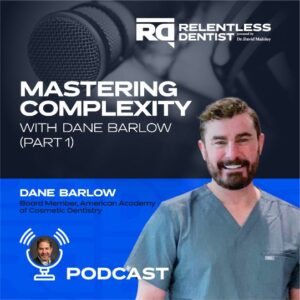 Joining me on the show today is Dane Barlow, a world-class ceramist and board member for the American Academy of Cosmetic Dentistry. In part one of our two-part interview, he shares his methods and experiences taking incredibly complex tasks, breaking them down into their individual components, and mastering them in a short amount of time.
Joining me on the show today is Dane Barlow, a world-class ceramist and board member for the American Academy of Cosmetic Dentistry. In part one of our two-part interview, he shares his methods and experiences taking incredibly complex tasks, breaking them down into their individual components, and mastering them in a short amount of time.
Dane and I talk about dentistry, but mostly you’ll get to hear how he has developed a speed to skill development. From construction to business ownership and martial arts, Dane shares his story of transformation and insight on coming back from difficult times in life. He has managed to fit so much into his life, while still excelling at the things he takes on, so I know you’ll get a lot out of this conversation!
Key Quotes:
- “I came to the conclusion that I was worth more dead than alive.”
- “There was a whole period of my life where I had to learn to correct thought processes that were incorrect.”
- “I was a fighter—I wasn’t going to give up. I was scrounging with everything I had to not get beat.”
- “I say, ‘what do I want to accomplish?’ and then I find a way to do it.”
- “If you have a dream goal and you work yourself like crazy, sometimes you’ll get there.”
- “I was obsessed with obtaining the impossible, and anything I thought was right, I’d just do it.”
- “I thought I was diversifying, but everything I did was tied into homeownership, and when home ownership disappeared, my businesses went to nothing.”
- “If you’re doing something wrong, you add a coach.”
- “I’m going to give back to other people, and I’m going to recognize when other people need some hope.”
- “My dad said, ‘You’ll never be a hero’—but no, I’m sorry, but I’ve done it! I’ve done it.”
- “You want to know the secret? There’s no secret. Do what successful people do, and then do all the things unsuccessful people won’t do, and don’t do the things that successful people wouldn’t do.”
Featured on the Show:


by [email protected] | Nov 11, 2020 | Prescriptions for your Practice
Podcast: Play in new window | Download
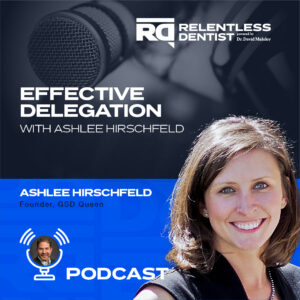 A lot of the burnout and frustration that dentists go through can be prevented by effective delegation. Ashlee Hirschfeld specializes in finding solutions to the challenges that hold business growth back, and in this episode, she will be sharing her insight and expertise in helping business owners get out of their own way and use delegation and other techniques to allow their businesses to thrive.
A lot of the burnout and frustration that dentists go through can be prevented by effective delegation. Ashlee Hirschfeld specializes in finding solutions to the challenges that hold business growth back, and in this episode, she will be sharing her insight and expertise in helping business owners get out of their own way and use delegation and other techniques to allow their businesses to thrive.
Listen in as we dive into the core problems in the industry and what we’ve seen dentists do poorly or well in this area. You will get some incredible insight into what good delegation looks like so that it doesn’t feel like you’re passing a baton that will eventually get dropped. Get out a pen and a journal because this episode has information that can have a massive impact on your dental practice.
Tune in to more Prescription for Your Practice Podcast
Key Quotes:
- “Dentists can be a bottleneck for a lot of things. By delegating this stuff to a personal executive or virtual assistant, you’re taking a lot of that stress off so you don’t have to be the bottleneck as much for your team.”
- “Delegation is a big key to growth, freedom of time, and freedom from stress.”
- “If you’re delegating really well, it puts you in more control.”
- “A lot of the time, people restrain from doing a good job because they’re afraid of doing it wrong or messing things up.”
- “We need to make sure we’re delegating the objective and not as much the process.”
- “If you haven’t done personality testing with your team, I highly recommend it. There are so many options out there.”
Featured on the Show:


by [email protected] | Nov 4, 2020 | Legendary Leadership
Podcast: Play in new window | Download
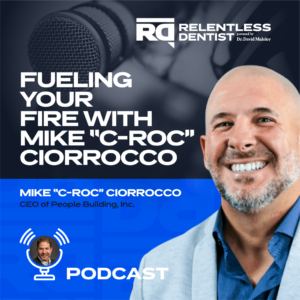 Through dealing with his parents’ complicated relationship, Mike “C-Roc” Ciorrocco learned an important life lesson: If you believe in something, stick to your guns. With that in the back of his mind, he knew he wanted to make something of himself and prove to others what he was made of. Today he joins the show to discuss how he is inspiring others through his business to see the greatness inside of themselves and use their past life events to fuel their fire.
Through dealing with his parents’ complicated relationship, Mike “C-Roc” Ciorrocco learned an important life lesson: If you believe in something, stick to your guns. With that in the back of his mind, he knew he wanted to make something of himself and prove to others what he was made of. Today he joins the show to discuss how he is inspiring others through his business to see the greatness inside of themselves and use their past life events to fuel their fire.
Listen in as Mike shares the importance of surrounding yourself with people who support you in your vision and do not hold you back. You will learn why doing a self-audit every once in a while is crucial, why he likes to keep things simple, and his key components to creating a powerful culture.
Key Quotes:
- “If you believe in something, stick to your guns.”
- “I’m not a comeback coach. I am an indestructible, unstoppable coach.”
- “You have to be clear with your intentions and goals.”
- “Make sure that you give a clear and big vision of your goals for your team so they understand where you are going as a team.”
- “If you’re not willing to get better, then you’re going to have to go somewhere else.”
- “Getting clear on what you want in life and making life happen rather than just happening to you, waking up in the morning and just going through the routine… I’m not okay with that, and I don’t like seeing people go through that.”
Featured on the Show:


by [email protected] | Oct 28, 2020 | Maverick Mind Shifts
Podcast: Play in new window | Download
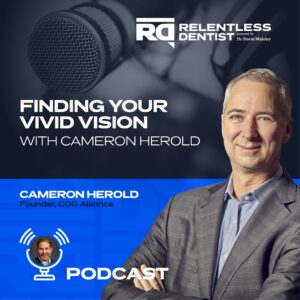 At the age of 21, Cameron Herold had 14 employees, and by 35, he had helped build his first two $100 million companies. Now a bestselling author and speaker, as well as the mastermind behind the exponential growth of hundreds of companies, Cameron has touched thousands of businesses indirectly through his work. Today he joins the show to discuss how to set the foundation for your vision so that your goals can start becoming a reality.
At the age of 21, Cameron Herold had 14 employees, and by 35, he had helped build his first two $100 million companies. Now a bestselling author and speaker, as well as the mastermind behind the exponential growth of hundreds of companies, Cameron has touched thousands of businesses indirectly through his work. Today he joins the show to discuss how to set the foundation for your vision so that your goals can start becoming a reality.
Listen in as Cameron explains how to create a vivid business vision—without watering it down by having too many people trying to help you craft it. You will learn the importance of hiring motivated and accountable people, how to run highly-effective meetings, and more.
Key Quotes:
- “Some people want to be a dentist, some want to be teachers—I wanted to be an entrepreneur right from the beginning.”
- “I see every business similar to a jigsaw puzzle. That if you are going to be building that jigsaw puzzle, the most important thing you start with is the picture on the front of the box. What are we building? What is the vision we are going to be building?”
- “Their job is to remember what [the vision] looks like. The team’s job is to figure out how to make it come true.”
- “Dentists have gotten really good at not doing dentistry.”
- “You don’t want to have a bunch of people help you craft your vivid vision because it becomes very watered down.”
- “I have the big things in my calendar first… and then all the busy work fits in around it.”
Featured on the Show:


by [email protected] | Oct 21, 2020 | Magnificent Marketing
Podcast: Play in new window | Download
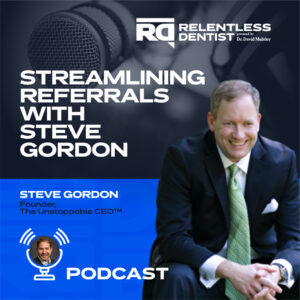 So many of us spend a fortune on ads, both digital and otherwise, but ROI on ad spend is minimal. Referrals are clearly one of the best ways to gain loyal, returning patients, but asking for those referrals is often too uncomfortable. So in this episode, Steve Gordon joins us to share his expertise on how to ask for and receive referrals in a way that is less intrusive and easier for your customers.
So many of us spend a fortune on ads, both digital and otherwise, but ROI on ad spend is minimal. Referrals are clearly one of the best ways to gain loyal, returning patients, but asking for those referrals is often too uncomfortable. So in this episode, Steve Gordon joins us to share his expertise on how to ask for and receive referrals in a way that is less intrusive and easier for your customers.
Listen in as we discuss the discomfort around asking for referrals and how to get past that by finding ways to inject value that will trigger streams of regular referrals. You will learn how to start moving past your comfort zone and finding the right way to prompt referrals in a natural way. Steve also shares tips and systems that simplify the referral process, for both the business and the client, in order to keep referrals coming in endlessly.
Tune in and find more Magnificent Marketing Podcast Episodes
Key Quotes:
- “Turn that into a situation where you’re actually injecting value into the relationship that actually triggers the referral.”
- “83% of customers are willing to refer after a positive experience, yet only 29% actually do.”
- “You take it from ‘hey can you bring someone in the door to be a patient?’ to ‘we’re on a mission to solve this particular problem for people, and I need your help on this mission.’ When you make it about enrolling them in the mission, all of a sudden you’re now aligned and they’re alongside you trying to help you.”
- “When you take the work off of them, your results tend to increase.”
- “You put yourself in the place of the patient and design a process that makes the whole experience easy for them.”
- “Take a tool or a process and wrap some marketing around it, give it a name, and explain it. Not only do you end up with a more educated client or patient, but now when they’re out in public, they can talk about what you do.”
Featured on the Show:


by [email protected] | Oct 14, 2020 | Magnificent Marketing
Podcast: Play in new window | Download
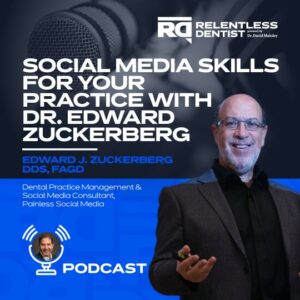 I’ve been podcasting for over 7 years now, and this interview is one of my absolute favorites! Dr. Edward Zuckerberg of Painless Social Media joins the show today to talk about his early adoption of technology, extreme attention to detail when dealing with fearful patients, and much more.
I’ve been podcasting for over 7 years now, and this interview is one of my absolute favorites! Dr. Edward Zuckerberg of Painless Social Media joins the show today to talk about his early adoption of technology, extreme attention to detail when dealing with fearful patients, and much more.
Listen in as Dr. Zuckerberg shares his journey, including what led him to become one of the most innovative dentists of his time. You’ll learn how he channels his passions for dentistry, marketing, and helping people, as well as how you can leverage social media and use tools you might not even know are already in your tool belt.
Tune in and find more Magnificent Marketing Podcast
Key Quotes:
- “I was looking to not have a tedious career. Adopting and implementing new technologies made the practice of dentistry fun for me.”
- “After extensive discussion, it was clear that going to the dentist wasn’t people’s favorite thing, so I tapped into my wife’s database of knowledge to develop protocols for treating people who were phobic of the dentist.”
- “With the phobic patients, they’re not going anywhere, even if they have changes in insurance.”
- “Provide channels for virtual consultations via teledentistry.”
- “I try to be a short-term therapist rather than a psychoanalyst.”
- “It’s really important for dentists to know how social media works and be involved in my initial training.”
- “Any content that can generate engagement is good, but you really want to create a bond between your staff and your patients.”
Featured on the Show:


by [email protected] | Oct 7, 2020 | Prescriptions for your Practice
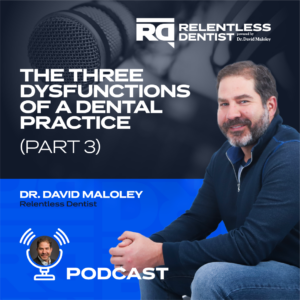 This is part three of my series called “The Three Dysfunctions of a Dental Practice.” Before continuing with this episode, be sure to check out part one, where I talk about why dentists are looking for external solutions to their internal problems, and part two that covers a common false belief that many dentists have. In this third and final episode, I will discuss how dentists are often too busy working in their businesses and as a result, they fail to work on their businesses to give them the momentum that they need.
This is part three of my series called “The Three Dysfunctions of a Dental Practice.” Before continuing with this episode, be sure to check out part one, where I talk about why dentists are looking for external solutions to their internal problems, and part two that covers a common false belief that many dentists have. In this third and final episode, I will discuss how dentists are often too busy working in their businesses and as a result, they fail to work on their businesses to give them the momentum that they need.
Listen in as I explain how to stop juggling every role and goal and trade it in for a structured and simplified framework that will help you be everything you need to be. And in order to get the greatest good from this training, I recommend that you take a look at the video training that latches directly on to today’s episode. It provides some great visuals and stories to help you understand why prioritization is so important and what might happen if you ignore this blueprint for your life and practice.
Enroll in your free video training here: How The Most Successful Dental Practice Owners Work Less & Make More Every Year
Key Quotes:
- “If we have the intention and intensity to be really good at a role, the outputs will be much more favorable.”
- “There are three activators to practice mastery: one is marketing, one is innovation, and one is cost control.”
- “As the practice owner, you have a ton of roles, a ton of goals, and switching from one to the other is an exhausting process that leads to all sorts of problems like burnout and other ugly things.”
- “The most important day in a businessperson’s life is the day they stop being a doer and start being a marketer.”
- “If you become more valuable to the marketplace, you become less replaceable and that gives you options.”
- “Your practice should deliver more time freedom and more financial freedom to you year after year.”
Featured on the Show:


by [email protected] | Oct 2, 2020 | Prescriptions for your Practice
Podcast: Play in new window | Download
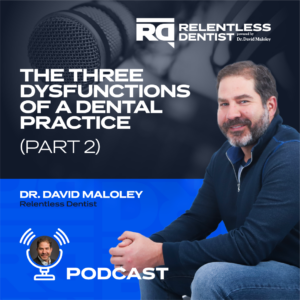 This is part two of my three-part series called “The Three Dysfunctions of a Dental Practice.” Before continuing with this episode, I encourage you to listen to part one, where I share why dentists are constantly looking for external solutions to their internal problems and how to fix this. Today I will be discussing the false belief many dentists have that their number one job is being a good clinician when it is actually being a good leader.
This is part two of my three-part series called “The Three Dysfunctions of a Dental Practice.” Before continuing with this episode, I encourage you to listen to part one, where I share why dentists are constantly looking for external solutions to their internal problems and how to fix this. Today I will be discussing the false belief many dentists have that their number one job is being a good clinician when it is actually being a good leader.
Listen in as I explain three activators that drive mastery within your practice: goodwill, case acceptance, and team building. You will learn the importance of building trust and rapport with your clients, how to create a “surprise and delight” aspect of your service, and how to ensure you have the right members on your team. If you are looking to grow your business and create long-lasting clients, this is the episode for you.
Enroll in your free video training here: How The Most Successful Dental Practice Owners Work Less & Make More Every Year
Tune in and find more Prescriptions for Your Practice Podcast Episodes
Key Quotes:
- “Everything you do is a marketing asset or a marketing liability.”
- “A dental practice isn’t limited by its opportunities—it’s limited by its leader.”
- “You can’t really fake trust, so you have to make sure that you and your team are working in your patient’s interest.”
- “When it comes to team building, we have to make sure we have the right players on the team.”
- “Ideal team players are hungry, humble, and smart.”
Featured on the Show:


by [email protected] | Sep 23, 2020 | Prescriptions for your Practice
Podcast: Play in new window | Download
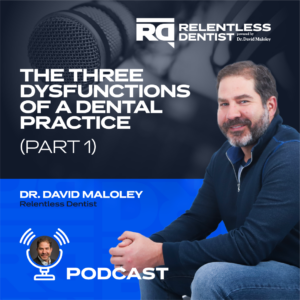 Today I’m kicking off a new 3-part series called “The Three Dysfunctions of a Dental Practice.” These dysfunctions are alive and well in most dental practices, and they’re usually hidden in plain sight. So in this first episode of the series, I’ll be discussing how dentists are constantly looking for external solutions to their internal problems—and what to do about it.
Today I’m kicking off a new 3-part series called “The Three Dysfunctions of a Dental Practice.” These dysfunctions are alive and well in most dental practices, and they’re usually hidden in plain sight. So in this first episode of the series, I’ll be discussing how dentists are constantly looking for external solutions to their internal problems—and what to do about it.
This section is specific to identity, so I’ll explain how the organization takes on the personality of its leader, as well as how we need to be working on our own personal mastery in order to level up our practices. If you struggle with delegation or feel like your team is too busy to take on more, you need to hear this because it is essential not only for your ability to grow but also for your practice’s ability to grow.
Enroll in your free video training here: How The Most Successful Dental Practice Owners Work Less & Make More Every Year
Tune in and get more insights on Prescriptions for Your Practice Episode Podcast
Key Quotes:
- “If we embrace these internal problems, the possibility is that we acknowledge that we are the bottleneck of the practice, and we can find ways to unlock its true potential and establish a more confident identity.”
- “If we don’t expand the capabilities and the identity of the leader, we work really hard for limited gain.”
- “Our energy is a role model for the whole team. We can’t expect our team members to be more passionate about the practice than we are.”
- “If it brings you energy, you need to double down on it.”
- “We have a leadership vacuum in our world, and what needs to fill this vacuum is high-integrity, courageous leaders.”
- “Full expression seems like an act of selfishness, but ultimately, it becomes an act of selflessness.”
- “We have this inner voice as dentists that says, ‘If it’s going to be done right, it’s gotta be done by us.’ But there’s an art to delegation.”
- “A barrier to delegation is feeling like the team already has too much work and you don’t want to put more on their plate. That’s a bit of a farce.”
Featured on the Show:


by [email protected] | Sep 9, 2020 | Maverick Mind Shifts
Podcast: Play in new window | Download
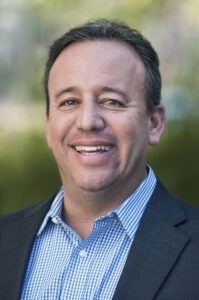 David Meltzer is the co-founder of Sports 1 Marketing, as well as the former CEO of Leigh Steinberg Sports Entertainment Agency. He also wrote a book and made two fortunes as an attorney and a salesman. His life mission is to empower over one billion people to be happy, which has led him on an incredible journey to provide one thing of value in this world and to create a business that is driven by heart and soul.
David Meltzer is the co-founder of Sports 1 Marketing, as well as the former CEO of Leigh Steinberg Sports Entertainment Agency. He also wrote a book and made two fortunes as an attorney and a salesman. His life mission is to empower over one billion people to be happy, which has led him on an incredible journey to provide one thing of value in this world and to create a business that is driven by heart and soul.
Listen in to find out the four pillars of truth and how they can change your life. You’ll learn what David believes are the key components of true happiness, what most people are focusing on that is only holding them back, and his advice is for dentists facing uncertainty and anyone who is feeling they are just waiting for happiness to arrive.
Tune in to more Mind Shift Podcast Episodes
Key Quotes:
- “Those people that can enjoy the consistent, persistent pursuit of their potential, find the light, the love, and the lessons, have a grateful attitude are going to get more out of what they do.”
- “People have a very hard time distinguishing accountability from liability and responsibility, but once you do, it gives you complete control.”
- “We can control our heart set. We can control the way we feel, what we think, say, do, and believe.”
- “Let’s learn how to love what you don’t love. Let’s learn how to enjoy the grit. Let’s learn how to enjoy the hustle.”
- “Happiness is the ups and the downs of growing the business and the lessons that we learned and the people that we meet and the challenges that we have.”
- “Happiness is the greatest virus ever created. It’s shared simply by witnessing it. It strengthens you mentally, physically, emotionally, and even financially.”
Featured on the Show:


 Joining me on the show today is Dane Barlow, a world-class ceramist and board member for the American Academy of Cosmetic Dentistry. In part one of our two-part interview, he shares his methods and experiences taking incredibly complex tasks, breaking them down into their individual components, and mastering them in a short amount of time.
Joining me on the show today is Dane Barlow, a world-class ceramist and board member for the American Academy of Cosmetic Dentistry. In part one of our two-part interview, he shares his methods and experiences taking incredibly complex tasks, breaking them down into their individual components, and mastering them in a short amount of time.


 A lot of the burnout and frustration that dentists go through can be prevented by effective delegation. Ashlee Hirschfeld specializes in finding solutions to the challenges that hold business growth back, and in this episode, she will be sharing her insight and expertise in helping business owners get out of their own way and use delegation and other techniques to allow their businesses to thrive.
A lot of the burnout and frustration that dentists go through can be prevented by effective delegation. Ashlee Hirschfeld specializes in finding solutions to the challenges that hold business growth back, and in this episode, she will be sharing her insight and expertise in helping business owners get out of their own way and use delegation and other techniques to allow their businesses to thrive. Through dealing with his parents’ complicated relationship, Mike “C-Roc” Ciorrocco learned an important life lesson: If you believe in something, stick to your guns. With that in the back of his mind, he knew he wanted to make something of himself and prove to others what he was made of. Today he joins the show to discuss how he is inspiring others through his business to see the greatness inside of themselves and use their past life events to fuel their fire.
Through dealing with his parents’ complicated relationship, Mike “C-Roc” Ciorrocco learned an important life lesson: If you believe in something, stick to your guns. With that in the back of his mind, he knew he wanted to make something of himself and prove to others what he was made of. Today he joins the show to discuss how he is inspiring others through his business to see the greatness inside of themselves and use their past life events to fuel their fire. At the age of 21, Cameron Herold had 14 employees, and by 35, he had helped build his first two $100 million companies. Now a bestselling author and speaker, as well as the mastermind behind the exponential growth of hundreds of companies, Cameron has touched thousands of businesses indirectly through his work. Today he joins the show to discuss how to set the foundation for your vision so that your goals can start becoming a reality.
At the age of 21, Cameron Herold had 14 employees, and by 35, he had helped build his first two $100 million companies. Now a bestselling author and speaker, as well as the mastermind behind the exponential growth of hundreds of companies, Cameron has touched thousands of businesses indirectly through his work. Today he joins the show to discuss how to set the foundation for your vision so that your goals can start becoming a reality. So many of us spend a fortune on ads, both digital and otherwise, but ROI on ad spend is minimal. Referrals are clearly one of the best ways to gain loyal, returning patients, but asking for those referrals is often too uncomfortable. So in this episode, Steve Gordon joins us to share his expertise on how to ask for and receive referrals in a way that is less intrusive and easier for your customers.
So many of us spend a fortune on ads, both digital and otherwise, but ROI on ad spend is minimal. Referrals are clearly one of the best ways to gain loyal, returning patients, but asking for those referrals is often too uncomfortable. So in this episode, Steve Gordon joins us to share his expertise on how to ask for and receive referrals in a way that is less intrusive and easier for your customers. I’ve been podcasting for over 7 years now, and this interview is one of my absolute favorites! Dr. Edward Zuckerberg of
I’ve been podcasting for over 7 years now, and this interview is one of my absolute favorites! Dr. Edward Zuckerberg of  This is part three of my series called “The Three Dysfunctions of a Dental Practice.” Before continuing with this episode, be sure to check out
This is part three of my series called “The Three Dysfunctions of a Dental Practice.” Before continuing with this episode, be sure to check out  This is part two of my three-part series called “The Three Dysfunctions of a Dental Practice.” Before continuing with this episode, I encourage you to
This is part two of my three-part series called “The Three Dysfunctions of a Dental Practice.” Before continuing with this episode, I encourage you to  Today I’m kicking off a new 3-part series called “The Three Dysfunctions of a Dental Practice.” These dysfunctions are alive and well in most dental practices, and they’re usually hidden in plain sight. So in this first episode of the series, I’ll be discussing how dentists are constantly looking for external solutions to their internal problems—and what to do about it.
Today I’m kicking off a new 3-part series called “The Three Dysfunctions of a Dental Practice.” These dysfunctions are alive and well in most dental practices, and they’re usually hidden in plain sight. So in this first episode of the series, I’ll be discussing how dentists are constantly looking for external solutions to their internal problems—and what to do about it. David Meltzer is the co-founder of
David Meltzer is the co-founder of